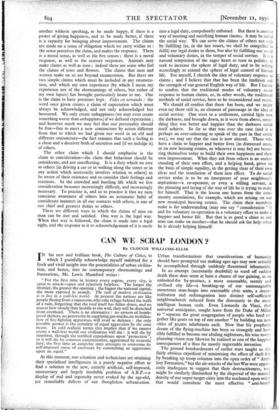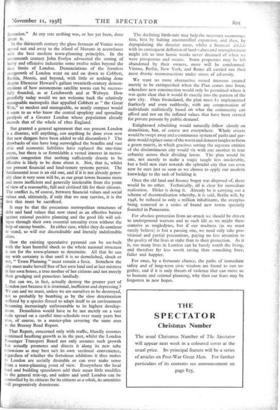CAN WE SCRAP LONDON?
By CLOUGH WILLIAMS-ELLIS
IN his new and brilliant book, The Culture of Cities, to which I gratefully acknowledge myself indebted for a fresh and vivid insight into the potentialities of urban civilisa- tion, and hence, into its contemporary shortcomings and frustrations, Mr. Lewis Mumford writes : " For the first time in history every region, every city, is open to attack—open and relatively helpless. The longer the frontier, the greater the opening ; the bigger the national capital, the more exposed to assault. The task of modern civilisation is to live in a wall-less world. At present the nations are like people fleeing from a rainstorm, who take refuge behind the walls of a ruin, forgetting that the roof itself has fallen down, and no matter how closely they huddle to the wall, they will be drenched from overhead. There is no alternative : no system of bomb- proof shelters, no generosity in supplying gas-masks,no mobilisa- tion of fire-fighting apparatus, will avail as defence : the only possible answer is the certainty of equal aggression by the same means. In cold realistic terms this implies that if we cannot create a wall-less world our civilisation will die : it will die by inanition, through the terrified expenditure upon 'protection", or it will die by common extermination, aggravated by neurotic fury, the first time an autarchic state attempts to overcome its self-imposed sense of enclosure by committing an aggression upon an equal."
At this moment, our scientists and technicians are straining their specialised intelligences in a purely negative effort to find a solution to the new, entirely artificial, self-imposed, unnecessary and largely insoluble problem of A.R.P.—a display of zeal and ingenuity never evoked by the age-old, yet remediable defects of our thoughtless urbanisation. Urban transformations that considerations of humanity should have prompted our making ages ago may now actually be accomplished through suddenly threatened inhumanity.
In an attempt (necessarily doubtful) to ward off sudden death there does seem at least a chance of our gaining, as an unlooked-for by-product, a more reasonable, seemly and civilised city life—a breaking-up of our unmanageable monstrous man-heaps into reasonable civic units, a decen- tralisation and redintegration into distinct self-sufficient neighbourhoods reduced from the dinosauric to the more intelligent human scale. Even Leonardo da Vinci, that universal anticipator, sought leave from the Duke of Milan to "separate the great congregation of people who herd to- gether like goats on top of one another" by building ten new cities of 30,000 inhabitants each. Now that his prophetic dream of the flying-machine has been so strangely and hor- ribly fulfilled to become our abiding nightmare, his wise town planning vision may likewise be realised as one of the happier consequences of a thus far mostly regrettable invention.
The ground bombardments of earlier wars taught us the fairly obvious expedient of minimising the effect of shell fire by breaking up troop columns into the open order of" Artil- lery Formation," but the air-attacks of the last War were appar- ently inadequate to suggest that their destructiveness, too, might be similarly diminished by the dispersal of the massed density of our super-target cities into the nucleated open order that would constitute the most effective "anti-bomb formation." At any rate nothing was, or has yet been, done about it.
In the thirteenth century the glass furnaces of Venice were moved out and away to the island of Murano in accordance with the best modem town-planning principles. In the seventeenth century John Evelyn advocated the zoning of heavy and offensive industries some twelve miles beyond the then limits of London. Denunciations of the formless overgrowth of London went on and on down to Cobbett, Ruskin, Morris, and beyond, with little or nothing done despite Ebenezer Howard's gallant twentieth-century demon- strations of how autonomous satellite towns can be success- fully founded, as at Letchworth and at Welwyn. How gratefully today would we not welcome back the relatively manageable metropolis that appalled Cobbett as "the Great Wen," so modest and manageable, so neatly compact would it seem to us who know the central apoplexy and spreading paralysis of a Greater London whose population already exceeds that of the whole of 1800 England.
But granted a general agreement that our present London is a disaster, will anything, can anything be done even now that new dangers have been added to old discomforts ? The drawbacks of size have long outweighed the benefits and vast civic and economic liabilities have replaced the one-time assets, but there is so formidable a vested interest in metro- politan congestion that nothing sufficiently drastic to be effective is likely to be done about it. Not, that is, whilst our present financial and land-tenure systems persist. The fundamental issue is an old one, and if it is not already gener- ally clear it very soon will be, as our great towns become more and more inefficient and generally intolerable from the point of view of a reasonable, full and civilised life for their citizens. The conflict is, of course, between financial values and social values and, ultimately, if only that we may survive, it is the first that must be sacrificed.
It may be that the precarious metropolitan structures of debt and land values that now stand, as an effective barrier against rational positive planning and the good life will col- lapse through their own essential unreality even without the help of enemy bombs. In either case, whilst they do continue to stand, so will our discreditable and literally indefensible cities.
How the existing speculative pyramid can be un-built with the least harmful shock to the whole national structure is not for the town-planner to determine. All that he can say with certainty is that until it is so demolished, shock or not, "Town Planning" must remain a farce. Somehow the city must make herself free of her own land and at last mistress in her own house, a true mother of her citizens and not merely their grudging and penurious landlady.
But can we, in fact, actually destroy the greater part of London just because it is irrational, inefficient and depressing ? We can and we must, unless we are ourselves to be destroyed, not so probably by bombing as by the slow deterioration suffered by a species forced to adapt itself to an environment becoming increasingly unfavourable to its highest develop- ment. Demolition would have to be not merely on a vast scale spread on a careful time-schedule over many years but also, of course, to a master-plan covering the same area as the Bressey Road Report That Report, concerned only with traffic, blandly assumes continued headlong growth as in the past, whilst the London Passenger Transport Board not only assumes such growth but actually promotes and directs it along its new tube extensions as may best suit its own sectional convenience, regardless of whether the fortuitous additions it thus makes to London are socially desirable or can ever make sense from a town-planning point of view. Everywhere the local land and building speculators add their mean little muddles to the general mix-up, and unless and until London can be controlled by its citizens for its citizens as a whole, its amenities will progressively deteriorate. The declining birth-rate may help the necessary reconstruc- tion, first by halting uncontrolled expansion, and then, by depopulating the drearier areas, whilst a financial ‘kbdcle with its consequent deflation of land-values and unemployment might jolt us into heroic works never dreamed of when we were prosperous and secure. Some properties may be left abandoned by their owners, more will be condemned. Vienna, Berlin, New York, and Rome all carried out their most drastic reconstructions under stress of adversity.
We want no more obstructive vested interests created merely to be extinguished when the Plan comes into force, wherefore new construction would only be permitted where it was quite clear that it would fit exactly into the pattern of the new city. Once formulated, the plan must be implemented fearlessly and even ruthlessly, with any compensation of individuals realistically based on what the community can afford and not on the inflated values that have been created for private persons by public demand.
Enlightened rebuilding would naturally follow closely on demolition, but, of course not everywhere. Whole streets would be swept away and a continuous system of parks and gar- dens would replace some of the worst and densest tangles to form a green matrix, in which gracious setting the separate entities of the disContinuous city would vie with one another in true urbanity across their dividing lawns. The plan would be one, not merely to make a tragic tangle less intolerable, but a bold new start towards the splendid city that can even now be ours just so soon as we choose to apply our modern knowledge to the task of building it.
Once the old land and finance bogey was disposed of, there would be no other. Technically, all is clear for immediate realisation. Hider is doing it. Already he is carrying out a scheme of decentralisation whereby, it is said, Berlin will, by 1948, be reduced to only a million inhabitants, the overplus being removed to a series of brand new towns specially founded in Pomerania.
For absolute protection from air-attack we should be driven to underground warrens and to such life as we might there contrive as troglodytes, but if our madness (as we must surely believe) is but a passing one, we need only take pro- visional and partial precautions, paying no less attention to the quality of the lives at stake than to their protection. As it is, too many lives in London can be barely worth the living, and therefore far less worth saving than something finer, fuller and happier.
For once, by a fortunate chance, the paths of immediate safety and of long-term civic wisdom are found to run to- gether, and if it is only threats of violence that can move us to humane and rational planning, why then our fears may be forgotten in new hopes.











































 Previous page
Previous page